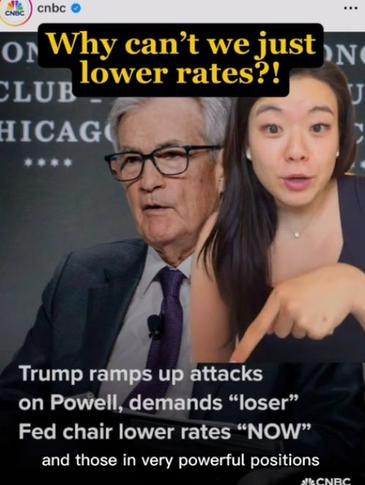Why We Can’t Just Lower Interest Rates (Explained Like You’re 5)
A lot of people, both those who follow me and those in very powerful positions, are wondering, why can't we just lower interest rates? Money's a construct. That'll fix everything, right? Not quite. Let's follow the money, do the math, and I'll show you why. I'm Vivian, your HBFF and your favorite Wall Street girly, and I teach you all the finance and economics you should have gotten in school so you follow me to get smarter with your money.
If the U.S. enters a recession, long-term interest rates are likely to go down. That's true. And the reason why this administration wants this totally makes sense. It's going to be a lot cheaper to refinance the U.S. government's debt. And we got a lot of debt. Assuming a 2% decline in rates, the U.S. government would save about $500 billion in annual interest payments. Sounds huge. But, and this is a massive but, recessions are typically a down period for the economy.
meaning the government would have to lower tax collections and increase the amount they pay out in unemployment benefits. And the historical deepening of the budget deficit during recessions is roughly about 4% of the GDP. That works out to be an additional $1.3 trillion erosion of US government finances in 2025 dollars.
Losing $1.3 trillion to save $500 billion does not make sense. And I'm not even the one who did the math. A lot of hedge funds and private equity firms are coming to this consensus. And whether you like them or not, one thing that they don't play about is their money. So TLDR, you can't fix a budget deficit by causing a recession in the hopes of lowering rates. It's like setting your house on fire in the hopes of lowering your heating bill. It doesn't make sense.
Why We Can’t Just Lower Interest Rates (Explained Like You’re 5)
A lot of people, both those who follow me and those in very powerful positions, are wondering, why can't we just lower interest rates? Money's a construct. That'll fix everything, right? Not quite. Let's follow the money, do the math, and I'll show you why. I'm Vivian, your HBFF and your favorite Wall Street girly, and I teach you all the finance and economics you should have gotten in school so you follow me to get smarter with your money.
If the U.S. enters a recession, long-term interest rates are likely to go down. That's true. And the reason why this administration wants this totally makes sense. It's going to be a lot cheaper to refinance the U.S. government's debt. And we got a lot of debt. Assuming a 2% decline in rates, the U.S. government would save about $500 billion in annual interest payments. Sounds huge. But, and this is a massive but, recessions are typically a down period for the economy.
meaning the government would have to lower tax collections and increase the amount they pay out in unemployment benefits. And the historical deepening of the budget deficit during recessions is roughly about 4% of the GDP. That works out to be an additional $1.3 trillion erosion of US government finances in 2025 dollars.
Losing $1.3 trillion to save $500 billion does not make sense. And I'm not even the one who did the math. A lot of hedge funds and private equity firms are coming to this consensus. And whether you like them or not, one thing that they don't play about is their money. So TLDR, you can't fix a budget deficit by causing a recession in the hopes of lowering rates. It's like setting your house on fire in the hopes of lowering your heating bill. It doesn't make sense.

This video gained popularity because it explains a complex economic issue — why we can’t simply lower interest rates to "fix everything" — in a simple, dynamic, and highly accessible way, right when public interest in the topic is high.
Vivian addresses a question that many people — both everyday viewers and even some in politics — genuinely ask: “If money is just a construct, why can’t we just lower the rates?” Instead of offering abstract theory, she uses real numbers and practical consequences that make sense to anyone. That’s crucial because economics often feels out of reach — but suddenly, it becomes clear and logical here.
Another key factor is her delivery. Vivian speaks with passion and confidence, but in a relaxed, friendly tone — like she’s explaining something to a friend, not lecturing a classroom. That tone builds trust and makes people feel like they’re genuinely learning, not just being talked at.
And the kicker: the analogy at the end — “it’s like burning your house down to lower your heating bill” — is a perfect example of memorable storytelling and meme-ready language that works brilliantly on social media. It’s funny, relatable, and highly shareable.
In short: the video went viral because it mixes education, current relevance, emotional tone, and humor — all while giving viewers that satisfying feeling of finally understanding something that used to feel intimidating.
Did you enjoy this video?
Leave your email address and we’ll deliver the best content from top business minds in the world — in the category you choose.

